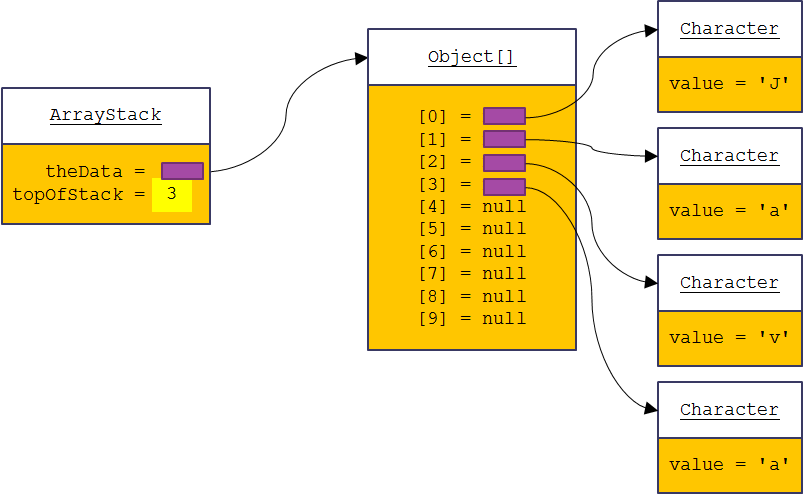public class ArrayStack<E> implements StackInt<E> {
private E[] theData;
int topOfStack = -1;
private static final int INITIAL_CAPACITY = 10;
@SupressWarnings("unchecked")
public ArrayStack() {
theData = (E[])new Object[INITIAL_CAPACITY];
}



Implementing a Stack Using an Array
If we implement a stack as an array, we would need ...
|
public class ArrayStack<E> implements StackInt<E> { private E[] theData; int topOfStack = -1; private static final int INITIAL_CAPACITY = 10;
@SupressWarnings("unchecked") public ArrayStack() { theData = (E[])new Object[INITIAL_CAPACITY]; } |

|

|
public E push(E obj) { if (topOfStack == theData.length - 1){ reallocate(); } topOfStack++; theData[topOfStack] = obj; return obj; } |
@Override public E pop() { if (empty()) { throw new EmptyStackException(); } return theData[topOfStack--]; } |
import java.util.EmptyStackException;
/** Implementation of the interface StackInt<E> using
* an array.
* @author Koffman & Wolfgang
*/
public class ArrayStack<E> implements StackInt<E> {
// Data Fields
/** Storage for stack. */
E[] theData;
/** Index to top of stack. */
int topOfStack = -1; // Initially empty stack.
private static final int INITIAL_CAPACITY = 10;
/**
* Construct an empty stack with the default
* initial capacity.
*/
public ArrayStack() {
theData = (E[]) new Object[INITIAL_CAPACITY];
}
/**
* Insert a new item on top of the stack.
* @post The new item is the top item on the stack.
* All other items are one position lower.
* @param obj The item to be inserted
* @return The item that was inserted
*/
@Override
public E push(E obj) {
if (topOfStack == theData.length - 1) {
reallocate();
}
topOfStack++;
theData[topOfStack] = obj;
return obj;
}
/**
* Remove and return the top item on the stack.
* @pre The stack is not empty.
* @post The top item on the stack has been
* removed and the stack is one item smaller.
* @return The top item on the stack
* @throws EmptyStackException if the stack is empty
*/
@Override
public E pop() {
if (empty()) {
throw new EmptyStackException();
}
return theData[topOfStack--];
}
/*<exercise chapter="3" section="3" type="programming" number="2">*/
/**
* Return the top item on the stack
* Pre: The stack is not empty
* Post: The stack remains unchanged
* @return The top item on the stack
* @throws EmptyStackException If the stack
* is empty
*/
@Override
public E peek() {
if (empty()) {
throw new EmptyStackException();
}
return theData[topOfStack];
}
/**
* Return true if the stack is empty
* @return True if the stack is empty
*/
@Override
public boolean empty() {
return topOfStack == -1;
}
/**
* Method to reallocate the array containing the stack data
* @post The size of the data array has been doubled
* and all of the data has been copied to the new array
*/
private void reallocate() {
E[] temp = (E[]) new Object[2 * theData.length];
System.arraycopy(theData, 0, temp, 0, theData.length);
theData = temp;
}
}